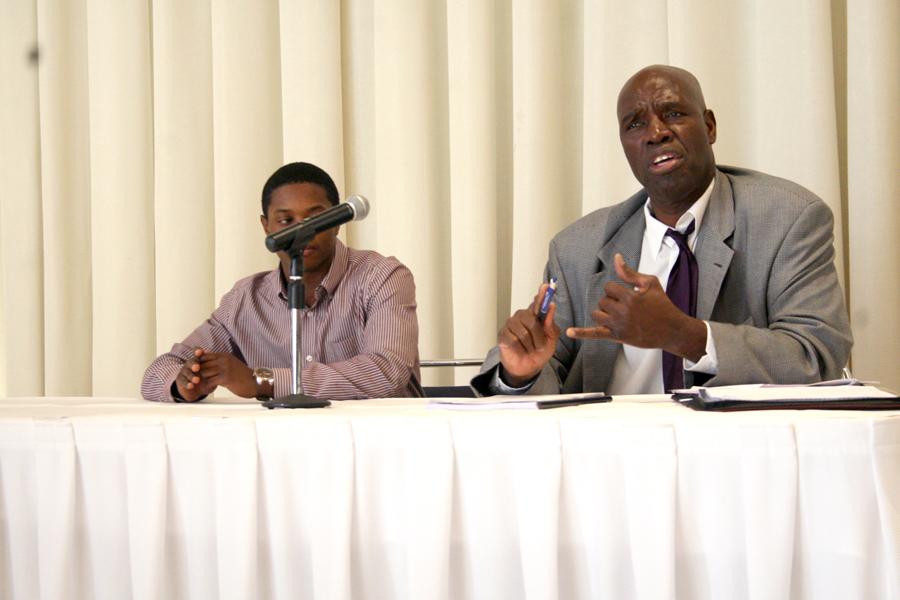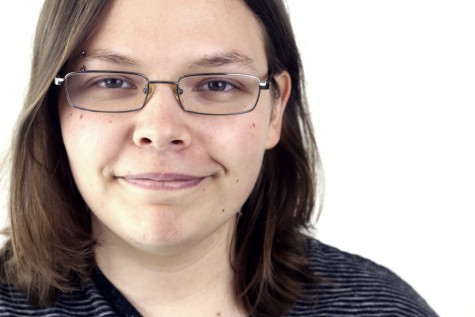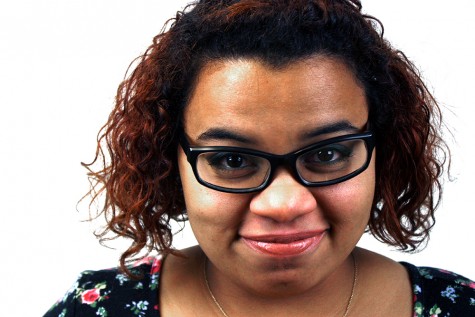Commission evaluates Eastern for accreditation
Hassimi Traore, a Higher Learning Commission member and a faculty member of the University of Wisconsin, addresses concerns with Eastern students about the staus of the university Tuesday in the University Ballroom of the Martin Luther King Jr, University Union.
October 21, 2014
Eastern is being evaluated this year for reaccreditation, a process that takes place every 10 years to determine whether or not the university is an effective institution.
As part of this process, the Higher Learning Commission, which is part of the North Central Association, has been on campus throughout the week making observations and hearing input from faculty, staff and students on Eastern’s progress since it was last assessed in 2005.
Commission member Fernando Delgado asked faculty members a hypothetical question during one of the forums Monday—He asked if the university would be ready to accommodate international and minority students if their numbers doubled next year.
Though many were confident in Eastern’s ability to work with international students, as it has many international instructors and mentors, most responded “no” immediately when Delgado asked the same question about minority students.
Grant Sterling, a philosophy professor, said Eastern is already having difficulty supporting the number of minority students it has, so such a dramatic increase would be a challenge.
“We’ve already substantially increased the number of students of color in a very short period of time,” Sterling said. “And so we have probably already surpassed what we were able to do, and we couldn’t do it again.”
Faculty members also expressed concern with the acceptance of minorities in the Charleston-Mattoon community.
“There’s been some grumblings in the community about the number of international students, which is actually quite small,” said Vernon Woodley, a sociology professor. “That’s expected, we are talking about two relatively small towns experiencing a shift in what they are accustomed to.”
Mildred Pearson, an education professor, said although Eastern excels in its capability to closely mentor students, it can improve on retaining faculty as well as meeting the needs of minority students.
“One of the things I would like to see our institution improve on is meeting the needs of our new demographic shift that’s coming to our campus,” Pearson said. “So we have 30 percent or higher demographic shift of minority students coming, so that means we need to train (faculty).”
Some of the topics students addressed during a forum on Tuesday include university resources and campus life.
Kayla Garner, a senior family and consumer sciences major, said Eastern offers various resources such as the writing center and health services.
Jaime Olson, a senior art major, said that while many resources are offered, using them should be optional.
“Some resources I don’t use, but I still have to pay for them,” Olson said.
Olson also said resources within the art department made it possible for her to create her own publication.
Catie Witt, a sophomore communication studies major, said Eastern offers affordable access to textbooks.
“It is cheaper than other universities,” Witt said. “We shouldn’t complain because it could be way worse.
Commission member Hassini Traore asked students for their input on class availability.
Olson said while sections are limited during registration, there are always plenty of options to fulfill their requirements.
Cameron Stone, a senior career and technical education major, said the campus is disconnected from Charleston.
“You don’t live in Charleston, you live in Eastern. It’s like its own little community,” he said.
Traore said the purpose of the visit is to make sure five certain criteria are being met and that things are running as they should within the university.
Commission member Don Larson said the group would draft a report on its findings by December, and the decision whether or not to reaccredit Eastern would be made by mid spring 2015.
Larson also said the accreditation process would occur every eight years from now on, with follow-ups and assistance being provided in between.
Stephanie Markham and Debby Hernandez can be reached at 581-2812 or dennewsdesk@gmail.com.



















![[Thumbnail Edition] Senior Foward Macy McGlone, getsw the ball and gets the point during the first half of the game aginst Western Illinois University,, Eastern Illinois University Lost to Western Illinois University Thursday March 6 20205, 78-75 EIU lost making it the end of their season](https://www.dailyeasternnews.com/wp-content/uploads/2025/03/WBB_OVC_03_O-1-e1743361637111-1200x614.jpg)


















































